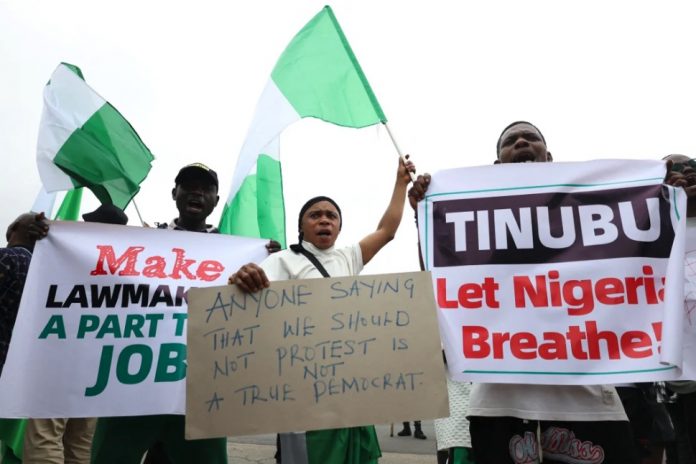การประท้วงปะทุขึ้นในเมืองต่างๆ ของไนจีเรียเมื่อวันพฤหัสบดี ในขณะที่ประชาชนที่ไม่พอใจออกมาเดินขบวนบนถนน แสดงความโกรธต่อความหิวโหยที่เพิ่มมากขึ้นและ “การปกครองที่ไม่ดี” การประท้วงเหล่านี้เป็นส่วนหนึ่งของคลื่นความไม่สงบที่แพร่กระจายไปทั่วแอฟริกา ซึ่งส่งผลกระทบต่อประเทศต่างๆ เช่น เคนยา ยูกันดา กานา และไนจีเรียในปัจจุบัน ในบางพื้นที่ รวมถึงรัฐโยเบและคาโนะ การประท้วงทำให้เกิดความสับสนอลหม่าน โดยทางการบังคับใช้คำสั่งเคอร์ฟิวตลอด 24 ชั่วโมง เนื่องจากทรัพย์สินส่วนตัวและสาธารณะถูกปล้น และยานพาหนะถูกเผา ในเมืองคาโน ผู้ประท้วงบุกโจมตีและปล้นทรัพย์สินในอุทยานนวัตกรรมดิจิทัลที่จะเปิดในสัปดาห์หน้า ตามที่รัฐมนตรีกระทรวงคมนาคม โบซุน ทิจานี กล่าว ได้ยินเสียงปืนดังขึ้นในกรุงอาบูจา เมืองหลวงและรัฐไนเจอร์ ในขณะที่ตำรวจใช้แก๊สน้ำตาสลายผู้ประท้วง ในประเทศไนเจอร์ สื่อท้องถิ่นรายงานว่า มีผู้เสียชีวิตอย่างน้อย 6 ราย
ผู้ประท้วงที่ออกมาชุมนุมภายใต้แนวร่วม “ยุติการปกครองที่ไม่ดีในไนจีเรีย” และใช้สโลแกน “10 วันแห่งความโกรธเกรี้ยว” เรียกร้องให้มีการคืนสถานะเงินอุดหนุนเชื้อเพลิงที่ยกเลิกไปเมื่อเดือนพฤษภาคมปีที่แล้ว ส่งผลให้ค่าอาหารและค่าขนส่งเพิ่มขึ้นอย่างมาก การประท้วงสะท้อนให้เห็นถึงความไม่พอใจอย่างกว้างขวางท่ามกลางอัตราการว่างงานที่สูงและอัตราเงินเฟ้อ 34% ซึ่งสูงที่สุดในรอบเกือบ 30 ปี เดเล ฟาโรติมิ โฆษกแนวร่วมกล่าวว่าความอดอยากทำให้ชาวไนจีเรียเป็นหนึ่งเดียวกันจากทุกความแตกแยก เมื่อวันจันทร์ ประธานาธิบดี Tinubu เพิ่มค่าจ้างขั้นต่ำเป็นสองเท่า และยกเลิกภาษีนำเข้าอาหารเพื่อแก้ไขภาวะเงินเฟ้อ รัฐมนตรีกระทรวงสารสนเทศ โมฮัมเหม็ด อิดริส ตั้งข้อสังเกตว่ารัฐบาลได้เปิดศูนย์จำหน่ายข้าวในราคาที่ถูกลง ผู้ประท้วงยังเรียกร้องให้ดำเนินการกับปัญหาด้านความปลอดภัยที่เลวร้ายลง รวมถึงการลักพาตัว
นี่เป็นการประท้วงที่มีการประสานงานครั้งใหญ่ครั้งแรกในไนจีเรีย นับตั้งแต่การประท้วง EndSARS นองเลือดเพื่อต่อต้านความโหดร้ายของตำรวจในปี 2563 ซึ่งทำให้กองกำลังความมั่นคงยิงใส่ผู้ประท้วงที่ไม่มีอาวุธ ชาวไนจีเรียรู้สึกไม่พอใจกับความแตกต่างระหว่างการต่อสู้ดิ้นรนกับวิถีชีวิตที่หรูหราของผู้นำ ประธานาธิบดีโบลา ตินูบูเผชิญกระแสตอบโต้ต่อแผนการใช้จ่ายของรัฐบาล แม้ว่าหนี้ของประเทศจะเพิ่มขึ้นและวิกฤตค่าครองชีพก็ตาม เมื่อปีที่แล้ว ผู้ร่างกฎหมายปฏิเสธเรือยอทช์ของประธานาธิบดี แต่อนุมัติงบประมาณสำหรับกองเรือของประธานาธิบดี รถเอสยูวี และการปรับปรุงที่อยู่อาศัย ทำให้เกิดการวิพากษ์วิจารณ์ที่ให้ความสำคัญกับความหรูหราในขณะที่ประชาชนต้องทนทุกข์ทรมาน
Violence erupts as Nigerians protest widespread hunger across the country

Protests erupted in multiple Nigerian cities on Thursday as frustrated citizens took to the streets, expressing their anger over rising hunger and “bad governance.” These demonstrations are part of a broader wave of unrest spreading across Africa, affecting countries like Kenya, Uganda, Ghana, and now Nigeria. In some areas, including Yobe and Kano states, the protests descended into chaos, with authorities imposing a 24-hour curfew as private and public properties were looted and vehicles burned. In Kano, protesters stormed and looted a Digital Innovation Park set to open next week, according to Communications Minister Bosun Tijani. Gunshots were heard in the capital Abuja and neighbouring Niger state as police used tear gas to disperse protesters. In Niger, local media reported that at least six people are feared dead.
Demonstrators, rallying under the ‘End Bad Governance in Nigeria’ coalition and using the slogan “10 Days of Rage,” are calling for the reinstatement of a fuel subsidy removed last May, which caused sharp increases in food and transportation costs. The protests reflect widespread frustration amid high unemployment and 34% inflation, the highest in nearly 30 years. Dele Farotimi, a coalition spokesperson, said hunger has united Nigerians across all divides. On Monday, President Tinubu doubled the minimum wage and removed food import taxes to address inflation. Information Minister Mohammed Idris noted that the government has opened centres selling rice at reduced prices. Protesters are also demanding action on worsening security issues, including kidnappings.
This is the first major coordinated protest in Nigeria since the deadly EndSARS demonstrations against police brutality in 2020, which saw security forces fire on unarmed protesters. Nigerians are also upset by the contrast between their struggles and their leaders’ luxury lifestyles. President Bola Tinubu has faced backlash over government spending plans despite mounting national debt and a cost-of-living crisis. Last year, lawmakers rejected a presidential yacht but approved a budget for a presidential fleet, SUVs, and residence renovations, drawing criticism for prioritising luxury while citizens suffer.
By CNN NEWS

















